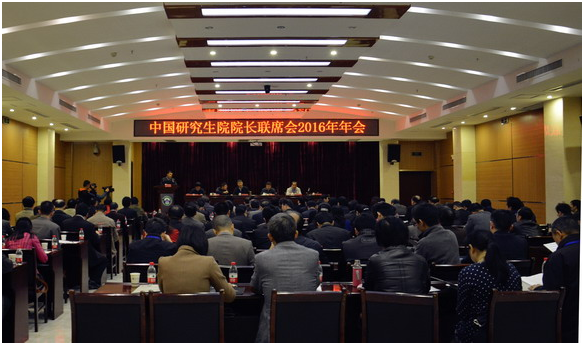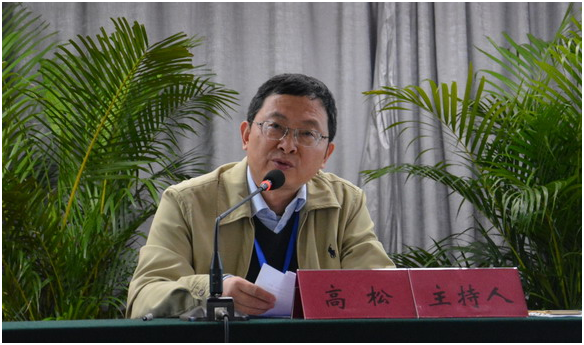From November 4 to 5, the 2016 annual meeting of the Association of Chinese Graduate Schools(ACGS)was held in Wuhan University, where more than 100 deans and vice deans of graduate schools from 60 members and invited units of the Joint Association, including Peking University and Tsinghua University, gathered in Luojia Villa to discuss the development and improvement of graduate education.
Xu Zhongbo, Deputy Director General of the Department of Degree Management and Postgraduate Education of the Ministry of Education, Ren Zenglin, Deputy Director of the Center for Development of Degree and Postgraduate Education of the Ministry of Education, Han Jin, Secretary of the Party Committee of Wuhan University, and Huang Jian, Deputy Director of Hubei Provincial Department of Education, attended the conference. The opening ceremony of the conference was hosted by academician Shu Hongbing, Vice President of Wuhan University.

The theme of this year's conference is "Optimizing Structure, Improving Supply, and Comprehensively Improving Graduate Education", and the participants had extensive and in-depth exchanges and discussions on such topics as reforming the system and mechanism of graduate student enrollment, innovating the mode of graduate student cultivation, improving the quality of graduate student cultivation, and building the internal and external quality assurance system of graduate education. Xu Zhongbo pointed out in his speech that
Xu Zhongbo pointed out in his speech that the next ten years is an important period for the development of higher education in China, and it is an important period for the development of postgraduate education. To run a good postgraduate education, it is necessary to have good teachers, attract good students, and have a good system and guarantee. The deans should be bold in reform and innovation, optimize the stock and make better increment, so as to better play the role of postgraduate education in the cultivation of high-level talents and high-level scientific research.
During the report stage of the conference, Ren Zenglin gave a comprehensive and systematic report on the latest progress of the fourth round of discipline assessment and the sampling and submission of doctoral dissertations for review and quality assurance. The deans of graduate schools of 11 universities, including Yao Qiang of Tsinghua University, Gong Qihuang of Peking University, Zhu Junjie of Nanjing University, Wu Hongchun of Xi'an Jiaotong University, Bai Haili of Tianjin University, Wang Yanfen of University of Chinese Academy of Sciences, Zhou Xianli of Southwest Jiaotong University, Wang Junzheng of Beijing University of Technology, Chen Chuanfu of Wuhan University, Wang Ming of Beijing Normal University, and Zhong Yang of Fudan University, made a presentation on their respective schools' research on resource allocation for graduate students (especially Ph. The deans of the graduate schools of 11 universities, including Chen Chuanfu of Wuhan University, Wang Ming of Beijing Normal University, and Zhong Yang of Fudan University, made an in-depth elaboration and report on the reform initiatives, effectiveness and problems of their respective schools in terms of resource allocation, enrollment, cultivation, management, supervisory team, curriculum construction, award system and quality assurance.
During the thematic discussion stage, the participating deans and experts were divided into three groups on the reform of graduate student enrollment, reform of cultivation mode, and construction of quality supervision and guarantee system, which were discussed in the following aspects: better use of performance indicators for resource allocation, coordinating the management of full-time and part-time graduate students, opening up the indicator channel from master's degree to doctoral degree, appropriately increasing the number of direct doctoral students, strengthening the process management, implementing multiple selection, establishing the mechanism of triage and elimination, and The meeting held extensive exchanges and in-depth discussions on issues such as further strengthening the classification and cultivation, solving the problems in the cultivation of professional degree students, stimulating the enthusiasm and autonomy of faculties and departments, and reached a number of consensus.
Academician Gao Song, Secretary General of the Joint Conference of Deans and Vice President and Dean of Graduate School of Peking University, presided over the closing ceremony of the conference and delivered a speech. Gao Song pointed out that the full play of the high-end leading role of graduate education depends on the promotion of the supply-side structural reform of graduate education, especially in the following reform tasks to make a breakthrough. Firstly, it is necessary to build a multi-faceted collaborative governance system. The second is to actively explore and reform the mode and mechanism of cultivating top innovative talents, and highlight the core position of talent cultivation. Thirdly, to enhance high-level scientific research capability oriented by major national needs. Fourth, to promote substantial cooperation with world-class universities and academic institutions.

Finally, academician Gao Song put forward the questions to be considered by the Graduate School and the Joint Committee under the macro background of "double first-class" construction: how to follow the essence and inherent laws of the development of postgraduate education for postgraduate training? How to build a new system of postgraduate education with the scale structure to meet the needs, cultivation mode with its own characteristics, continuous improvement of cultivation quality, and continuous emergence of outstanding innovative talents? How to make graduate education truly take the path of internal development, serve the needs and continuously improve the quality? How to internalize the external rigid institutional constraints into internal flexible quality culture? How to fully mobilize the enthusiasm of instructors, graduate students and various management and service departments? How can the Council speak out on behalf of graduate schools and play a greater role in leading the development of graduate education and strengthening coordination with government departments?
Since its establishment in 1999, the Council has adhered to the system of annual meeting and set the theme every year according to the key points and hot spots of the development of graduate education. The leaders, deans and experts at the meeting thought that this year's theme and sub-themes were set in line with the current needs and hit the main points. The structural supply-side reform of graduate education involves not only the formulation of policies at the national level, but also the independent action of cultivation units, which ultimately comes to "improving the quality and serving the demand".
Wuhan University's meticulous and thoughtful conference service was also appreciated by everyone.
Secretariat of ACGS
November 7th, 2016

